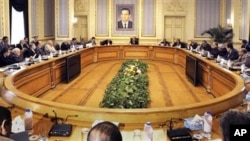A university professor told VOA Egyptian protesters will not agree to the latest concessions made by President Hosni Mubarak’s administration aimed at resolving the ongoing crisis.
Said Sadek, professor of political sociology at the American University of Cairo, said the demonstrators will not accept the latest government concessions saying the only way out of the crisis is for President Mubarak to step down and face possible prosecution for his nearly three-decade authoritarian rule.
“The main objective is that President Mubarak leaves because they consider him as the source of instability…When the revolution started, we have seen how the police were overrunning people with armored vehicles, (and) how they were shooting people,” said Sadek.
“So, the images of the regime that tolerated and accepted and promoted such brazen violations of human rights are too difficult to accept. The protesters will not accept making this president continue because he violated the public oath to protect the people.”
This came after Vice President Omar Suleiman held unprecedented talks Sunday with a range of opposition factions, including the officially banned Muslim Brotherhood.
But, the opposition participants said the offers were insufficient adding that they are sticking to their demand for an immediate end to President Mubarak's nearly 30 years in power.
The talks were the first known discussions in years between the government and the Brotherhood, an outlawed Islamist group that provides social services to the country's poor and whose members have served in parliament as independents.
Thousands of anti-government protesters occupied Cairo's Tahrir Square for a 13th day and into the night Sunday, vowing to remain until Mr. Mubarak quits and defying government appeals to clear the area and return to work.
Sadek said the protesters will continue with the “revolution” to bring about democracy without Mr. Mubarak.
“What we are seeing today is that the government is trying to meet the demands of the people by coming up with different excuses and explanations why the president has to complete his term. People cannot accept this,” said Sadek.
“Those international organizations and the United States, why were (they) silent about human rights violations in Egypt during the last three decades? Why (were) successive American presidents silent about the unbelievable wealth of President Mubarak and his family? Now, you want the people to believe that those international powers want democracy in Egypt? I mean, there is no credibility in the American position on this issue.”
Meanwhile, The United Nations estimates more than 300 people have died and thousands have been wounded in Egypt since the anti-Mubarak protests began.
The Egyptian government tried to restore a sense of normality in Cairo Sunday by re-opening some banks and encouraging people to return to work.
For the first time in a week, bank customers lined up to withdraw money. But, the government ordered the banks to limit the size of withdrawals and limited opening hours.











